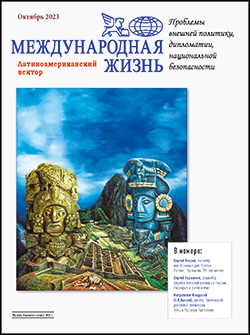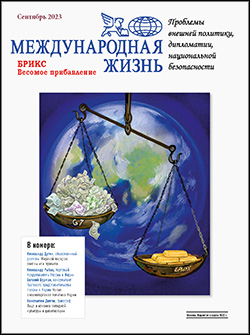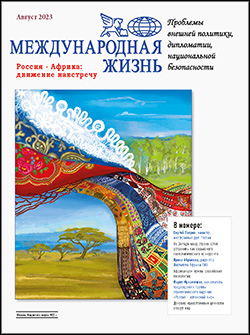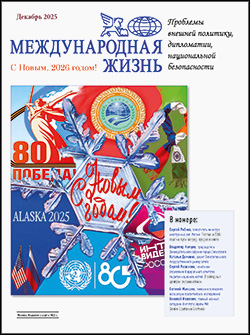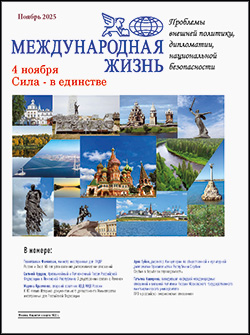DIPLOMACY
Sergey Ryabkov.There is no common denominator in Russian-American relations
Russian-American relations, which once gave some people in Moscow and Washington, I think, false illusions that we might be moving from good to better, have now become just one of the platforms in the common struggle of those who advocate for a more just and multipolar world (Russia is in their eyes). this process), and those who seek to defend and strengthen the historical hegemony of the collective West. And there, of course, is the leader, the chief executive, the chief conductor.
Key words: Foreign Policy Concept, New Start Treaty, Group of Seven Summit in Hiroshima, Free Trade Zone, "color revolutions", CFE Treaty, NATO, BRICS, globalist elites.
POLITICS
Sergey Velichkin. India continues to pursue its interests
After the beginning of the SWO, the question was whether the Anglo-Saxons and the rest of the collective West, which had implicitly obeyed them, would be able to impose their own diktat in world affairs, crushing Russia and thereby teaching a lesson to all those who pursue their own independent national-oriented foreign policy. The doom of this venture is evident from the position taken by one of the largest countries on the planet - India.
Key words: SWO, sanctions, India, Russia, USA, China, G20 ,N. Modi.
Alexander Kolesnikov, Mehmet Urper. The "Turkoman factor" of Turkey's policy on Syria
Recently, Ankara has succeeded in creating a zone under its control on the Syrian border territory, displacing the predominantly Kurdish population and relocating a large number of Turkomans to this place, and is using Turkoman armed units in joint operations not only against ISIL units, but also against Syrian government forces and Kurdish formations.
Keywords: Turkey, Syria, Turkomans, Bashar al-Assad, ISIS, Kurds, Aleppo, Muslim educa tion.
ECONOMIC FACTOR
Victor Supyan. US economy: prospects for post-crisis development
In the first decades of the twenty-first century, the United States faced a number of serious . These are, firstall, the crisis of 2008-2009, the cyclical crisis of 2020, which coincided with the COVID-19 pandemic, and, finally, the unprecedented high , which exceeded the level of 8% in 2022. Despite these challenges and a slowdown in growth, the United States continues to maintain its leadership in the global economy.
Keywords: US economy, economic potential, scientific and technical potential, factors of long-term development, factors of post-crisis economic recovery, economic model, economic forecasts, role of the state.
Fyodor Arzhaev,Vladislav Andryukhin,Dmitry Kritsky, Anton Kotik, Daria Saprynskaya. National strategies of Central Asian countries as a tool for ensuring social stability: the poverty factor
Poverty has always been and remains one of the key global problems, including for the Central Asian states. It is fair to note that the systemic nature of poverty creates concomitant problems: low level of education, forced migration due to unemployment, etc. At the same time, the degree of integration of Central Asia into global economic chains remains weak.
Keywords: poverty, Central Asia, Eurasian integration, international financial organizations, multi-vector approach, national development strategies.
INFORMATION SECURITY
Anatoly Smirnov, Valeria Bulva. The" cyber rule " of the collective West bypassing the UN and other universal structures is the way to undermine the world order
The West's tactic of promoting projects that bypass existing UN formats also affects the digital sphere. Among them are the Paris Call for Trust and Security in Cyberspace, the Global Partnership for Artificial Intelligence, the Future Technologies Forum, and many others.
Keywords: information security, collective West, UN, world order, "cyber rule".
Denis Podolsky. Genocide issues in the Information war of the West against Russia
At the forefront of the hybrid war between Russia and the collective West is the information space, which immediately and sharply reacts to any fluctuations in the political situation, focusing on this or that issue. The concept of genocide has become one of the most significant topics for marking current political events.
Keywords: genocide, information warfare, information policy, international law, Russophobia, anti-Russian rhetoric, neo-Nazism, falsification of history.
Maria Bazlutskaya. Practice of proactive digital diplomacy in modern international relations
In the context of the crisis of the world order, a change in the properties of digital diplomacy can be traced. Increasingly, messages appear in the information field that are not so much stating as warning. This is especially evident in the context of the Ukrainian conflict in the absence of dialogue and diplomatic relations. Digital diplomacy is increasingly playing a proactive role rather than a reactive one, replacing, for example, negotiation platforms.
Keywords: digital diplomacy (CD), Zaporizhia NPP, SVO, CD as an instrument of external pressure, hacker groups, crowdsourcing.
TRENDS
Ivan Kravchenko. On the critique of non-pure reason
Once upon a time, in one of the troubled provinces of the great empire, Pontius Pilate asked, as it seemed to him, a small man from the deep people: "What is truth?" Modern political science, represented by those who still adequately assess the world around them, can offer its own version of the answer. And it will be disappointing and hopeless: this is what we are losing. Something that eludes us, and by our own unwise will.
Keywords: "decomposition of truth", fact, opinion, criticism of political realism, quality of the media environment, adequacy of political decisions.
Mikhail Krapiva. Multi-ethnicity as a means of achieving the goals of Western countries in relation to the Western Balkan states. On the example of North Macedonia
The processes of globalization and universalization have led to the emergence of polyethnicity within the same society and state. This phenomenon is widespread in the Balkans. The so-called Western Balkan States are of the greatest interest in this regard. Among them, North Macedonia is a multinational state, one of the characteristic features of which is a rather complex network of interethnic relations.
Keywords: multi-ethnicity, multi-ethnic society, national identity, Western Balkan states, Ohrid Framework Agreement, Prespa Agreement, EU, USA.
IN MEMORIAM
Evgeny Pyadyshev. The man who came up with the "common European home". To the 100th anniversary of Anatoly Gavrilovich Kovalev
G. Kovalev inMinistry circlesand notonly-manlegend. He went through every step of the steep career ladder-from an intern in the office of a political adviser in the Soviet Military Administration in Germany to the first Deputy Minister of Foreign Affairs of the USSR and Russia. In his diplomatic portfolio - participation and first parties in the main European subjects of post-war international relations.
Keywords: to the 100th anniversary of A. G. Kovalev.
LIBRARY
Sergey Filatov. England - Russia: treachery without love
Britain is an existential enemy of Russia. The long history of this geopolitical confrontation in various regions of the world - from Central Asia to Africa, from Crimea to Petropavlovsk-Kamchatsky - is described in detail in the new book "England - Russia: Treachery without Love" by Armen Hovhannisyan, Editor-in-Chief of the International Life magazine, and Igor Prokopenko, Deputy General Director for Documentary and Journalistic Projects at Ren TV, published in Russian and English.
Keywords: the book " England - Russia: Treachery without love" by Igor Prokopenko and Armen Hovhannisyan.
Читайте другие материалы журнала «Международная жизнь» на нашем канале Яндекс.Дзен.
Подписывайтесь на наш Telegram – канал: https://t.me/interaffairs

 12:44 27.05.2023 •
12:44 27.05.2023 • 